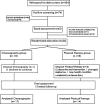Comparative Cognitive Effects of Choreographed Exercise and Multimodal Physical Therapy in Older Adults with Amnestic Mild Cognitive Impairment: Randomized Clinical Trial
- PMID: 31868666
- PMCID: PMC7029368
- DOI: 10.3233/JAD-190552
Comparative Cognitive Effects of Choreographed Exercise and Multimodal Physical Therapy in Older Adults with Amnestic Mild Cognitive Impairment: Randomized Clinical Trial
Abstract
Background: Recent research on mild cognitive impairment (MCI) has primarily focused on searching for measures to prevent or delay the progression of MCI to dementia. Physical exercise has shown to be effective in the prevention of age-related cognitive decline in elderly adults with MCI. However, the most effective type and dose of exercise for the improvement of cognition are yet to be determined.
Objective: To compare the cognitive effects of choreographed exercise (Choreography group) with a multimodal physical therapy program (Physical Therapy group) in elderly adults with amnestic MCI, a population with an increased risk of developing dementia.
Methods: We conducted a randomized clinical trial with two parallel groups under allocation concealment and assessor blinding. Participants were allocated into Choreography or Physical Therapy group and performed exercises twice per week in 60-minute sessions during 12 weeks.
Results: Thirty-six participants with amnestic MCI, ages 65 to 85, were assessed at baseline and after 12 weeks of intervention, by comprehensive validated neuropsychological and physical assessments. A Repeated measures General Lineal Model showed statistically significant differences in cognitive and physical outcomes. Both groups significantly improved in visual delayed recall. The Choreography group exhibited significantly more benefits on verbal recognition memory than the Physical Therapy group.
Conclusion: Greater cognitive benefits were achieved in the choreographic intervention than in the multimodal physical therapy, mainly in those functions more related to the risk of conversion to dementia. Additional studies are needed to confirm whether the observed effects are related to delayed onset of Alzheimer's disease in elderly adults with amnestic MCI.
Keywords: Aging; Alzheimer’s disease; cognitive decline; dancing; mild cognitive impairment; motor skills; neuropsychology; physical activity; physical exercise; physical therapy.
Conflict of interest statement
Authors’ disclosures available online (
Figures
References
-
- Oltra-Cucarella J, Ferrer-Cascales R, Alegret M, Gasparini R, Díaz-Ortiz LM, Ríos R, Martínez-Nogueras ÁL, Onandia I, Pérez-Vicente JA, Cabello-Rodríguez L, Sánchez-Sansegundo M (2018) Risk of progression to Alzheimer’s disease for different neuropsychological mild cognitive impairment subtypes: A hierarchical meta-analysis of longitudinal studies. Psychol Aging 33, 1007–1021. - PubMed
-
- Espinosa A, Alegret M, Valero S, Vinyes-Junqué G, Hernández I, Mauleón A, Rosende-Roca M, Ruiz A, López O, Tárraga L, Boada M (2013) A longitudinal follow-up of 550 mild cognitive impairment patients: Evidence for large conversion to dementia rates and detection of major risk factors involved. J Alzheimers Dis 34, 769–780. - PubMed
-
- Tabert M, Manly J, Liu X, Pelton G, Rosenblum S, Jacobs M, Zamora D, Goodking M, Bell K, Stern Y, Devanand D (2006) Neuropsychological prediction of conversion to alzheimer disease in patients with mild cognitive impairment. Arch Gen Psychiatry 63, 916–924. - PubMed
-
- Sperling RA, Aisen PS, Beckett LA, Bennett DA, Craft S, Fagan AM, Iwatsubo T, Jack CRJ, Kaye J, Montine TJ, Park DC, Reiman EM, Rowe CC, Siemers E, Stern Y, Yaffe K, Carrillo MC, Thies B, Morrison-Bogorad M, Wagster M V, Phelps CH (2011) Toward defining the preclinical stages of Alzheimer’s disease: Recommendations from the National Institute on Aging-Alzheimer’s Association workgroups on diagnostic guidelines for Alzheimer’s disease. Alzheimers Dement 7, 280–292. - PMC - PubMed
-
- World Health Organization (2015) First WHO Ministerial Conference on Global Action Against Dementia In Call for action WHO, Geneva.
Publication types
MeSH terms
LinkOut - more resources
Full Text Sources
Medical



